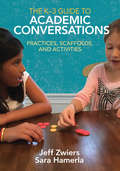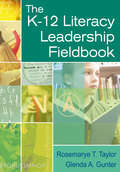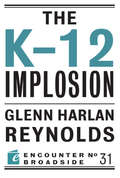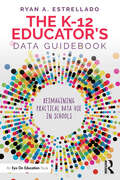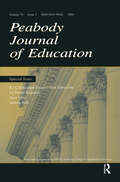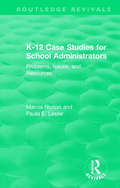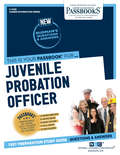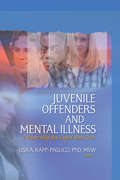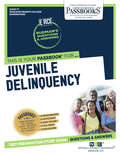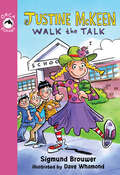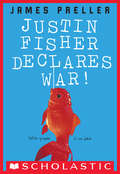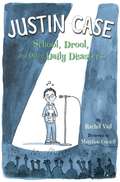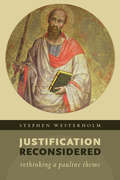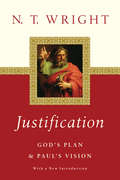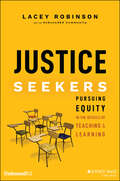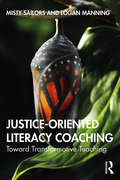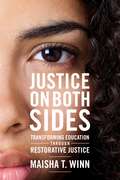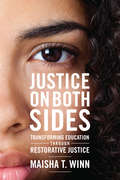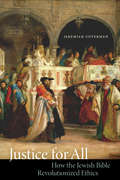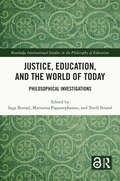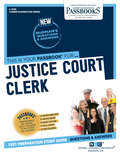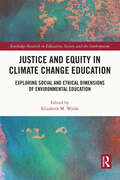- Table View
- List View
The K-3 Guide to Academic Conversations: Practices, Scaffolds, and Activities
by Jeff Zwiers Sara R. Hamerla“For thousands of years people have been using the skills we describe in this book to engage in conversations with others. What isn’t as prevalent, however, is instruction--especially in primary grades—in which we engage students in productive conversations about academic ideas. This book fills that very big need.” --Jeff Zwiers & Sara Hamerla Talk about content mastery . . . Primary teachers, you won’t want to miss this: if you’re looking for a single resource to foster purposeful content discussions and high-quality interpersonal engagement, then put Jeff Zwiers and Sara Hamerla’s K-3 Guide to Academic Conversations at the top of your reading list. Whether your students love to talk or not, all must be equipped with key conversation skills such as active listening, taking turns, posing, clarifying, supporting with examples, and arguing ideas. This ready resource comes packed with every imaginable tool you could need to make academic conversations part of your everyday teaching: Sample lesson plans and anchor charts Guidelines for creating effective prompts Applications across content areas, with corresponding assessments Rubrics and protocols for listening to student speech Transcripts of conversations and questions for reflection Companion website with video and downloadable resources Tens of thousands of students in the upper grades have reaped the benefits of academic conversations: high-quality face-to-face interactions, increased motivation, stronger collaborative argumentation skills, and better understanding and retention of content. The K-3 Guide to Academic Conversations is that resource for providing your primary students with the same powerful learning opportunities.
The K-12 Literacy Leadership Fieldbook
by Rosemarye T. Taylor Dr Glenda A. GunterThis fieldbook provides a plan for improving literacy for all students; students who enjoy reading become better writers, more involved learners, and joyful readers!
The K-12 Implosion
by Glenn Harlan ReynoldsEconomist Herb Stein famously said that something that can't go on forever, won't. For decades now, America has been putting ever-growing amounts of money into its K-12 education system, while getting steadily poorer results. Now parents are losing faith in public schools, new alternatives are appearing, and change is on the way. The K-12 Implosion provides a succinct description of what's wrong, and where the solutions are likely to appear, along with advice for parents, educators, and taxpayers.
The K-12 Educator’s Data Guidebook: Reimagining Practical Data Use in Schools
by Ryan A. EstrelladoThe K-12 Educator’s Data Guidebook is a comprehensive field guide for school professionals learning to use data. “Non-data people,” rejoice! Requiring no prior proficiency in data tools and programming, this book validates the implicit challenges of learning to use data to empower educators and features original real-world examples from in-service educators to illustrate common problem-solving. Each chapter uses stories, humor, and a human approach to set the tone for a safe and fun learning experience. Through this highly practical foundation, everyday educators can better engage school initiatives, professional development, and instructional challenges that require competent data use for improving school systems.
The K-12 Educator’s Data Guidebook: Reimagining Practical Data Use in Schools
by Ryan A. EstrelladoThe K-12 Educator’s Data Guidebook is a comprehensive field guide for school professionals learning to use data. “Non-data people,” rejoice! Requiring no prior proficiency in data tools and programming, this book validates the implicit challenges of learning to use data to empower educators and features original real-world examples from in-service educators to illustrate common problem-solving. Each chapter uses stories, humor, and a human approach to set the tone for a safe and fun learning experience. Through this highly practical foundation, everyday educators can better engage school initiatives, professional development, and instructional challenges that require competent data use for improving school systems.
K-12 Education Finance: New Directions for Future Research: a Special Issue of the peabody Journal of Education
by Camilla Benbow Dean Peabody CollegeEducation finance researchers tend to organize their thoughts on important issues by considering one of the four foundational perspectives: equity, efficiency, liberty, and adequacy. The six essays presented in this special edition of the Peabody Journal of Education base their work within the context of the four pillars and present new directions for future research. While some of the articles isolate a concept for closer scrutiny, others draw attention to more interactive aspects of the pillars in question. Each article leaves the reader with important information and insightful questions about both the usuage and efficacy of education finance policies.
K-12 Case Studies for School Administrators: Problems, Issues, and Resources (Routledge Revivals #Vol. 52)
by Marcia Norton Paula E. LesterCase studies enable aspiring administrators to refine their reaction skills as well as their critical-thinking skills by responding to a multitude of problems in a short time. Originally published in 1998, the case studies in this book provide a broad-based overview of the kinds of real problems that schools were facing at the time. The problems administrators face on a daily basis vary in scope and complexity. Short cases provide opportunities to address, analyse, and resolve problems encountered in the real working environment. Students must actively engage in a process of inquiry and problem solving. This book can be used over several years according to the case studies selected for class use. This is a multicourse, multiyear action case-study text.
Juvenile Probation Officer: Passbooks Study Guide (Career Examination Series)
by National Learning CorporationThe Juvenile Probation Officer Passbook® prepares you for your test by allowing you to take practice exams in the subjects you need to study. It provides hundreds of questions and answers in the areas that will likely be covered on your upcoming exam, including but not limited to: records and reports; interviewing; adult and child psychology; and more.
Juvenile Offenders and Mental Illness: I Know Why the Caged Bird Cries
by Lisa A. Rapp-PaglicciGet the latest research on juvenile offenders who have a mental illnessMost youths in the juvenile justice system who have one or more mental disorders do not receive proper treatment or education, nor do they serve sentences appropriate for their crimes. Juvenile Offenders and Mental Illness: I Know Why the Caged Bird Cries takes a detailed look at the latest theories and empirically based information on the causal and recidivism problems youths with mental disorders face in the juvenile justice system. Respected experts comprehensively discuss the range of problems found in the assessment of mentally ill juvenile offenders and offer practical, effective treatment solutions.Juvenile Offenders and Mental Illness explains the cost-effective methodologies and presents the latest data on recidivism rates and occurrences of depression, Attention Deficit Hyperactivity Disorder (ADHD), and/or alcohol or substance abuse disorder among delinquent adolescents. Research studies also include data gleaned from the application of the Piers-Harris Children&’s Self-Concept Scale, the Beck Hopelessness Scale, and other scales and surveys on participants. Other topics include revealing data on the prevalence of lifetime use of Ecstasy (MDMA) and its effects; female shoplifting and its relationship to mental illness; incidence of trauma exposure in incarcerated youth; and strategies to enhance the effectiveness of interventions. The book includes helpful tables to clearly illustrate empirical data and provides detailed references for each chapter.Juvenile Offenders and Mental Illness provides the freshest research and insightful discussion on: adolescent stalking depression ADHD alcohol/substance abuse disorders Post Traumatic Stress Disorder (PTSD) Ecstasy (MDMA) use and its association with symptoms of anxiety or depression the impact of mental health treatment intensity on the emotional and behavioral problems of youth in a treatment facility shoplifting by female teens behavioral problems and suicide-tendency in youths who have been sexually abused or traumatized effective prevention and the reduction of violence by at-risk adolescentsJuvenile Offenders and Mental Illness: I Know Why the Caged Bird Cries provides vital research data and treatment options for social workers, forensic psychologists, and those working in the juvenile justice system.
Juvenile Delinquency: Passbooks Study Guide (Excelsior/Regents College Examination Series)
by National Learning CorporationThe Excelsior/Regents College Examinations (E/RCE) offer you an opportunity to obtain recognition for college-level learning and consists of exams designed to demonstrate achievement and mastery of various college-level subjects, such as the Arts and Sciences, Business, Criminal Justice, Education, Health and Nursing. The E/RCE Juvenile Delinquency Passbook® prepares you by sharpening knowledge of the skills and concepts necessary to succeed on the upcoming exam and the college courses that follow. It provides a series of informational texts as well as hundreds of questions and answers in the areas that will likely be covered on your upcoming exam.
Justine McKeen, Walk the Talk (Orca Echoes)
by Sigmund BrouwerMeet Justine McKeen. She's the Queen of Green! She talks a little too much, bosses a little too much and tells the truth, just not all at once. She's trying to save the planet, one person at a time, and when she decides to get something done, it's a lot of fun. In Justine McKeen, Walk the Talk, the second book in the Justine McKeen series, Justine decides there are too many cars idling in front of her school. So she comes up with a solution that should help keep the air cleaner. But she soon discovers not many adults trust her crazy ideas.
Justin Fisher Declares War!
by James PrellerFifth grade was different. Mr. Tripp was all about RULES and RESPECT and a bunch of other R words that Justin couldn't remember. He was no fun at all. Whatever Justin did, Mr. Tripp told him not to do. And the more Justin heard "No," the more he thought, "Yes, yes, yes!" Could he drive his teacher insane? Justin wasn't sure. But it was worth a try. By the third week of school, the war was on--even if Mr. Tripp didn't know it.
Justin Case: School, Drool, And Other Daily Disasters
by Rachel Vail Matthew CordellIt's the start of the school year, and nothing feels right to Justin. He didn't get the teacher he wanted, he's not in the same class as his best friend, and his little sister, Elizabeth, is starting kindergarten at his school. Elizabeth doesn't seem nervous at all. Justin is very nervous about third grade. And to top it off, he's lost his favorite stuffed animal, but he can't tell anyone, because technically he's too old to still have stuffed animals. Right? Here is third grade in all its complicated glory--the friendships, the fears, and the advanced math. Acclaimed author Rachel Vail captures third grade with a perfect pitch, and Matthew Cordell's line art is both humorous and touching. As Justin bravely tries to step out of his shell, he will step into readers' hearts.
Justification Reconsidered: Rethinking A Pauline Theme
by Stephen WesterholmMuch has been written of late about what the apostle Paul really meant when he spoke of justification by faith, not the works of the law. This short study by Stephen Westerholm carefully examines proposals on the subject by Krister Stendahl, E. P. Sanders, Heikki Raisanen, N. T. Wright, James D. G. Dunn, and Douglas A. Campbell. In doing so, Westerholm notes weaknesses in traditional understandings that have provoked the more recent proposals, but he also points out areas in which the latter fail to do justice to the apostle.Readers of this book will gain not only a better grasp of the ongoing theological debate about justification but also a more nuanced overall understanding of Paul.
Justice Seekers: Pursuing Equity in the Details of Teaching and Learning
by Lacey RobinsonRevolutionary solutions for an American school system that is systemically failing Black and brown children In Justice Seekers, celebrated social justice activist and veteran educator Lacey Robinson delivers an engaging combination of storytelling and research that explains why justice is something that is happening—or not happening—inside the classroom and within the details of teaching and learning. You’ll explore ways to identify and eliminate the shame-inducing pedagogies impacting Black and brown children from classrooms and the world at large. In the book, you’ll discover the many ways that justice is in the details of race, pedagogy, and standards-driven education, as well as: Strategies for challenging educators to see the ways in which they can contribute to eradicating racial inequity from the classroom and from society New ways to recognize and reduce the impact of low cognitive demand material presented to Black and brown children in schools across America Methods for improving the quality of your own teaching here and nowAn intuitive and exciting roadmap for K-12 teachers, teachers-in-training, school administrators, and principals who aim to reverse the racial injustices today’s children face every day, Justice Seekers also belongs in the hands of instructional coaches, coordinators, and concerned parents everywhere.
Justice-oriented Literacy Coaching: Toward Transformative Teaching
by Misty Sailors Logan ManningThis book explores notions of justice-oriented literacy coaching and offers a way of being in the world with young people, teachers, and communities that centers transformative coaching, teaching, and learning. It is intended to disrupt the traditional and historical positioning of literacy coaches in schools today. Through the lens of social justice and liberatory education, Sailors and Manning begin a dialogue with literacy coaches to help them reconsider their own roles and positions as agents of change in schools. Using vignettes and stories to illustrate potential paths into emancipatory literacy learning environments, the authors present literacy as a socially-situated act of meaning-making. Accessible and inviting, this book provides pragmatic tools for literacy leaders to embody social justice, to grapple with big social concepts, to imagine possibilities, and to stimulate creative thinking with the teachers at their schools and with the students in their classrooms. Intended for literacy coaches in grades K-6 and graduate students in literacy education, this book includes a wealth of resources and examples from real-world contexts, as well as spaces for the reader to interact and engage with the text through journaling and self-reflection.
Justice on Both Sides: Transforming Education through Restorative Justice (Race and Education)
by Maisha T. WinnRestorative justice represents “a paradigm shift in the way Americans conceptualize and administer punishment,” says author Maisha T. Winn, from a focus on crime to a focus on harm, including the needs of both those who were harmed and those who caused it. Her book, Justice on Both Sides, provides an urgently needed, comprehensive account of the value of restorative justice and how contemporary schools can implement effective practices to address inequalities associated with race, class, and gender. <p><p> Winn, a restorative justice practitioner and scholar, draws on her extensive experience as a coach to school leaders and teachers to show how indispensable restorative justice is in understanding and addressing the educational needs of students, particularly disadvantaged youth. Justice on Both Sides makes a major contribution by demonstrating how this actually works in schools and how it can be integrated into a range of educational settings. It also emphasizes how language and labeling must be addressed in any fruitful restorative effort. Ultimately, Winn makes the case for restorative justice as a crucial answer, at least in part, to the unequal practices and opportunities in American schools.
Justice on Both Sides: Transforming Education Through Restorative Justice (Race and Education)
by Maisha T. WinnRestorative justice represents &“a paradigm shift in the way Americans conceptualize and administer punishment,&” says author Maisha T. Winn, from a focus on crime to a focus on harm, including the needs of both those who were harmed and those who caused it. Her book, Justice on Both Sides, provides an urgently needed, comprehensive account of the value of restorative justice and how contemporary schools can implement effective practices to address inequalities associated with race, class, and gender. Winn, a restorative justice practitioner and scholar, draws on her extensive experience as a coach to school leaders and teachers to show how indispensable restorative justice is in understanding and addressing the educational needs of students, particularly disadvantaged youth. Justice on Both Sides makes a major contribution by demonstrating how this actually works in schools and how it can be integrated into a range of educational settings. It also emphasizes how language and labeling must be addressed in any fruitful restorative effort. Ultimately, Winn makes the case for restorative justice as a crucial answer, at least in part, to the unequal practices and opportunities in American schools.
Justice for All: How the Jewish Bible Revolutionized Ethics (JPS Essential Judaism)
by Jeremiah UntermanJustice for All demonstrates that the Jewish Bible, by radically changing the course of ethical thought, came to exercise enormous influence on Jewish thought and law and also laid the basis for Christian ethics and the broader development of modern Western civilization. Jeremiah Unterman shows us persuasively that the ethics of the Jewish Bible represent a significant moral advance over Ancient Near East cultures. Moreover, he elucidates how the Bible’s unique conception of ethical monotheism, innovative understanding of covenantal law, and revolutionary messages from the prophets form the foundation of many Western civilization ideals. Justice for All connects these timeless biblical texts to the persistent themes of our times: immigration policy, forgiveness and reconciliation, care for the less privileged, and attaining hope for the future despite destruction and exile in this world.
Justice, Education, and the World of Today: Philosophical Investigations (Routledge International Studies in the Philosophy of Education)
by Inga Bostad Marianna Papastephanou Torill StrandThis edited book challenges the limits of current educational philosophical discourse and argues for a restored normativisation of education through a powerful notion of justice. Moving beyond conventional paradigms of how justice and education relate, the book rethinks the promotion of justice in, for, and through education in its current state. Chapters combine international and diverse philosophical perspectives with a focus on contemporary issues such as climate change, the COVID-19 pandemic, racism, and migrant crises. Divided into three distinct parts, the book explores the ontological and socio-political grounds underlying our notions of education and justice, and offers self-reflective meta-critique on education philosophers’ tendency of promoting and upholding orthodox visions and missions. Ultimately, the book offers contemporary and innovative philosophical reflections on the link between justice and education, and enriches the discourse through a multi-perspectival and sensitive exploration of the topic. It will be of great interest to scholars, researchers, and postgraduate students in the fields of philosophy of education, education policy and politics, education studies and social justice.
Justice, Education, and the World of Today: Philosophical Investigations (Routledge International Studies in the Philosophy of Education)
by Inga Bostad Marianna Papastephanou Torill StrandThis edited book challenges the limits of current educational philosophical discourse and argues for a restored normativisation of education through a powerful notion of justice.Moving beyond conventional paradigms of how justice and education relate, the book rethinks the promotion of justice in, for, and through education in its current state. Chapters combine international and diverse philosophical perspectives with a focus on contemporary issues, such as climate change, the COVID-19 pandemic, racism, and migrant crises. Divided into three distinct parts, the book explores the ontological and socio-political grounds underlying our notions of education and justice, and offers self-reflective meta-critique on education philosophers’ tendency of promoting and upholding orthodox visions and missions. Ultimately, the book offers contemporary and innovative philosophical reflections on the link between justice and education, and enriches the discourse through a multi-perspectival and sensitive exploration of the topic. It will be of great interest to scholars, researchers, and postgraduate students in the fields of philosophy of education, education policy and politics, education studies, and social justice.The Open Access version of this book, available at www.taylorfrancis.com, has been made available under a Creative Commons Attribution-Non Commercial-No Derivatives 4.0 license. Funded by University of Oslo.
Justice Court Clerk: Passbooks Study Guide (Career Examination Series)
by National Learning CorporationThe Justice Court Clerk Passbook® prepares you for your test by allowing you to take practice exams in the subjects you need to study. It provides hundreds of questions and answers in the areas that will likely be covered on your upcoming exam, including but not limited to: record keeping and organization of data; clerical operations, including proofreading; understand and interpret written material, including legal policies and procedures; and other related areas.
Justice and Equity in Climate Change Education: Exploring Social and Ethical Dimensions of Environmental Education (Routledge Research in Education, Society and the Anthropocene)
by Elizabeth M. WalshThis volume looks at the ways in which climate change education relates to broader ideas of justice, equity, and social transformation, and ultimately calls for a rapid response to the need for climate education reform. Highlighting the role of climate change in exacerbating existing societal injustices, this text explores the ethical and social dimensions of climate change education, including identity, agency, and societal structure, and in doing so problematizes climate change education as an equity concern. Chapters present empirical analysis, underpinned by a theoretical framework, and case studies which provide critical insights for the design of learning environments, curricula, and everyday climate change-related learning in schools. This text will benefit researchers, academics, educators, and policymakers with an interest in science education, social justice studies, and environmental sociology more broadly. Those specifically interested in climate education, curriculum studies, and climate adaption will also benefit from this book.
Justice and Equity in Climate Change Education: Exploring Social and Ethical Dimensions of Environmental Education (Routledge Research in Education, Society and the Anthropocene)
by Elizabeth M. WalshThis volume looks at the ways in which climate change education relates to broader ideas of justice, equity, and social transformation, and ultimately calls for a rapid response to the need for climate education reform. Highlighting the role of climate change in exacerbating existing societal injustices, this text explores the ethical and social dimensions of climate change education, including identity, agency, and societal structure, and in doing so problematizes climate change education as an equity concern. Chapters present empirical analysis, underpinned by a theoretical framework, and case studies which provide critical insights for the design of learning environments, curricula, and everyday climate change-related learning in schools. This text will benefit researchers, academics, educators, and policymakers with an interest in science education, social justice studies, and environmental sociology more broadly. Those specifically interested in climate education, curriculum studies, and climate adaption will also benefit from this book.
